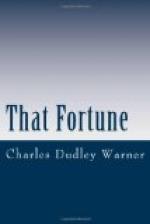In anticipating Philip’s career, however, it must not be understood that he had attained any wide public recognition. He was simply enrolled in the great army of readers and was serving his apprenticeship. He was recognized as a capable man by those who purvey in letters to the entertainment of the world. Even this little foothold was not easily gained in a day, as the historian discovered in reading some bundles of old letters which Philip wrote in this time of his novitiate to Celia and to his cousin Alice.
It was against Celia’s most strenuous advice that he had trusted himself to a literary career. “I see, my dear friend,” she wrote, in reply to his announcement that he was going that day to Mr. Hunt to resign his position, “that you are not happy, but whatever your disappointment or disillusion, you will not better yourself by surrendering a regular occupation. You live too much in the imagination already.”
Philip fancied, with that fatuity common to his sex, that he had worn an impenetrable mask in regard to his wild passion for Evelyn, and did not dream that, all along, Celia had read him like an open book. She judged Philip quite accurately. It was herself that she did not know, and she would have repelled as nonsense the suggestion that her own restlessness and her own changing experiments in occupation were due to the unsatisfied longings of a woman’s heart.
“You must not think,” the letter went on, “that I want to dictate, but I have noticed that men—it may be different with women—only succeed by taking one path and diligently walking in it. And literature is not a career, it is just a toss up, a lottery, and woe to you if you once draw a lucky number—you will always be expecting another . . . You say that I am a pretty one to give advice, for I am always chopping and changing myself. Well, from the time you were a little boy, did I ever give you but one sort of advice? I have been constant in that. And as to myself, you are unjust. I have always had one distinct object in life, and that I have pursued. I wanted to find out about life, to have experience, and then do what I could do best, and what needed most to be done. Why did I not stick to teaching in that woman’s college? Well, I began to have doubts, I began to experiment on my pupils. You will laugh, but I will give you a specimen. One day I put a question to my literature class, and I found out that not one of them knew how to boil potatoes. They were all getting an education, and hardly one of them knew how much the happiness of a home depends upon having the potatoes mealy and not soggy. It was so in everything. How are we going to live when we are all educated, without knowing how to live? Then I found that the masses here in New York did not know any better than the classes how to live. Don’t think it is just a matter of cooking. It is knowing how, generally, to make the most of yourself and of your opportunities, and have a nice world to live in, a thrifty, self-helpful, disciplined world. Is education giving us this? And then we think that organization will do it, organization instead of self-development. We think we can organize life, as they are trying to organize art. They have organized art as they have the production of cotton.




